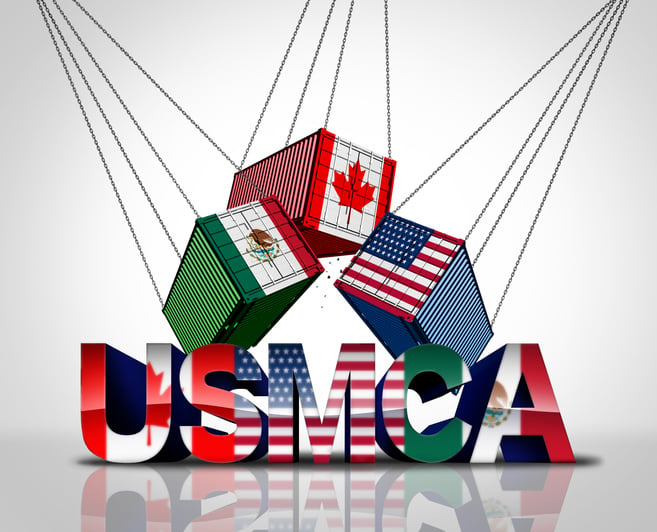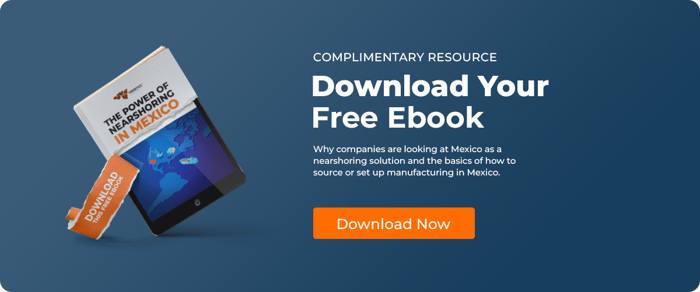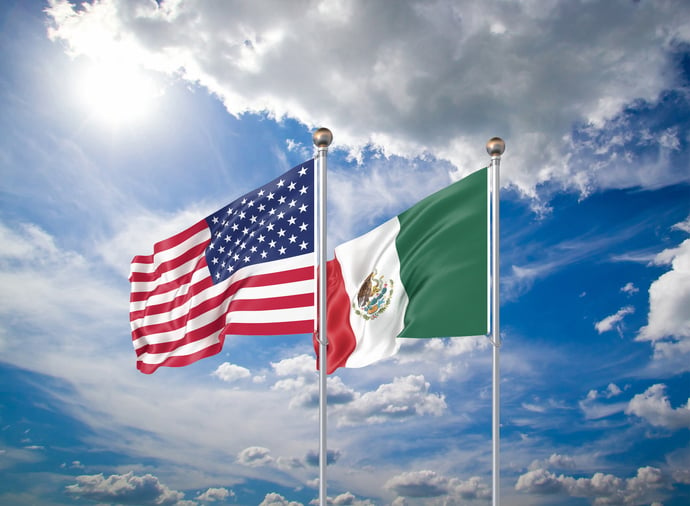Maquiladoras have been a significant force in helping Mexico increase its manufacturing output over the years. They are also an important asset for the Mexican economy and are accountable for about 45% of Mexico’s total exports. These manufacturing plants, often owned by foreign companies, operate in Mexico and produce goods for export to other countries. The benefits of maquiladoras are numerous, including employment opportunities, economic diversification, and technological advancement. The advantages of USMCA, the trade agreement between the United States, Canada, and Mexico, have also positively impacted maquiladoras in Mexico.
In this article, we will explore how maquiladoras have helped raise wages and improve working conditions for Mexican workers, and examine the advantages of USMCA, as well as other benefits that maquiladoras have brought to the country. Understanding the impact of maquiladoras on Mexico's economy is crucial to appreciating their role in the country's continued growth and development.
Key Advantages of USMCA for Maquiladoras
The trade agreement between the United States, Canada, and Mexico known as the USMCA, has brought many advantages to maquiladoras operating in Mexico. The USMCA replaced the North American Free Trade Agreement (NAFTA) which was enacted in 1994. While NAFTA provided benefits to maquiladoras, the USMCA has improved upon them. Some of the advantages of USMCA for maquiladoras include increased market access, lowered tariffs, and more predictable regulations. This has created a positive impact on investment and job creation in Mexico. These benefits of maquiladoras have helped Mexico increase its manufacturing output, diversify its economy, and improve its overall economic standing.
Other Benefits of Maquiladoras in Mexico
Beyond USMCA benefits, maquiladoras drive Mexico's manufacturing output, diversify the economy, and support local communities through technological advancement and job creation. Maquiladoras in Mexico support local communities through various programs and initiatives, contributing to the social and economic well-being of these communities. While there are certainly challenges and criticisms associated with maquiladoras, it is important to recognize the positive contributions they have made to Mexico's economy and society.
Maquiladoras' Impact on Wages and Working Conditions
Maquiladoras have also had a significant impact on wages and working conditions in Mexico. While significant strides have been made in boosting wages and improving working conditions, challenges such as inconsistent enforcement of labor laws show there’s still progress to be made. The advantages of USMCA have helped raise wages and improve working conditions for Mexican workers employed by maquiladoras. Under the USMCA, there are provisions related to labor that are intended to improve working conditions, including provisions that require companies to comply with local labor laws and regulations. This has led to increased scrutiny of labor practices in maquiladoras, which has helped to improve working conditions for workers. Additionally, maquiladoras have been involved in efforts to raise wages and improve benefits for workers, which has led to better living standards for many Mexican workers. Overall, maquiladoras have had a significant impact on wages and working conditions in Mexico, and the advantages of USMCA are helping to further improve the situation.
Maquiladoras have benefited Mexico’s economy, but they face criticism for low wages and poor working conditions. Despite some improvements, further progress is needed to address these issues fully. Maquiladoras have also been criticized for their impact on the environment, particularly in terms of pollution and waste. However, the advantages of USMCA are intended to address some of these concerns, including provisions related to labor and the environment.
Another challenge associated with maquiladoras is their dependence on foreign investment and demand. Maquiladoras rely heavily on foreign companies to provide investment and demand for their products. This makes them vulnerable to changes in the global economy, including changes in trade policies and demand for goods. However, efforts have been made to diversify Mexico's economy and reduce its reliance on maquiladoras. This includes efforts to attract investment in other sectors, such as tourism and technology. Overall, while there are certainly challenges and criticisms associated with maquiladoras, they have been a significant force in helping Mexico increase its manufacturing output and diversify its economy, and the advantages of USMCA are helping to address some of the concerns associated with them.
How to Begin Manufacturing in Mexico: Contact Visigistics Today!
Don't miss out on the incredible opportunities that manufacturing in Mexico has to offer! With maquiladoras playing a significant role in boosting the country's manufacturing output and the benefits of USMCA further improving working conditions and environmental standards, now is the perfect time to consider Mexico as your next manufacturing destination. At Visigistics, we have the experience and expertise to guide you through the process of setting up operations in Mexico, so you can take advantage of all the benefits that this country has to offer. From finding the right location to managing your supply chain, our team is here to support you every step of the way. Contact us today to learn more about how we can help you get started with manufacturing in Mexico.
Frequently Asked Questions:
How can one overcome the challenges of utilizing a maquiladora for manufacturing?
To overcome maquiladora challenges, address public perception with transparent practices, ensure regulatory compliance with local legal experts, and reduce logistical risks by partnering with third-party logistics providers. Outsource recruitment and management tasks, secure local funding, and implement retention strategies to maintain a skilled workforce. These steps help businesses effectively manage maquiladora operations.
What are the potential drawbacks of using a subcontracting company for manufacturing?
Subcontracting manufacturing can risk product quality, as you have less control over materials and processes. It also reduces transparency, making it harder to monitor facility conditions and ensure compliance with standards. While cost-effective, these drawbacks can impact the consistency and integrity of your product.
What documentation and details are required to apply to the IMMEX program for setting up a maquila?
To apply to the IMMEX program for setting up a maquila, you will need to provide a detailed list of all materials, tools, and equipment that are intended for import for use in the maquila operation, including the respective tariff classifications for each item. Additionally, you will be required to disclose the name of your company, the number of employees in your organization, any pertinent permits obtained from the Health or Labor departments, and provide evidence of contracts with utilities and service providers.
What are the different types of work visas available for foreign workers in Mexico?
There are three main types of work visas available for foreign workers in Mexico. The FMN visa type is designed for workers in the U.S. and Canada who will stay in Mexico for less than 30 days. The FMVC visa is similar to the FMN visa, but it is intended for workers residing outside of the U.S. and Canada. Lastly, the FM3 visa permits individuals to work in Mexico for up to two months within a one-year period and provides the opportunity for renewal for up to four more years after the initial year has concluded. Each visa type serves a specific purpose and duration for foreign workers seeking employment opportunities in Mexico.
What are the steps involved in establishing a maquiladora through direct ownership in Mexico?
To establish a maquiladora in Mexico through direct ownership, you’ll need a structured approach. The following steps guide you through compliance, setup, and operational preparation:
- Conduct a Feasibility Study
Assess costs, location, and resource availability to determine the viability of setting up a maquiladora. - Register with Mexican Authorities
Obtain the necessary permits and register with relevant bodies, including the National Maquiladora Industry Association. - Incorporate a Legal Entity
Establish a legal presence in Mexico by forming a local company, ensuring you can operate and meet regulatory requirements. - Apply for the IMMEX Program
Enroll in the IMMEX program to gain tax benefits on import-export activities. - Secure a Facility and Equipment
Find an appropriate facility and acquire the equipment necessary for your manufacturing operations. - Recruit a Local Workforce
Hire skilled local employees and assemble a capable management team to oversee daily operations. - Establish Logistics and Supply Chain Networks
Set up an efficient supply chain to ensure smooth operations and timely production. - Ensure Compliance with Regulations
Adhere to local labor and environmental laws to maintain compliance and operational stability.
What are the three options for starting to use a maquiladora program in Mexico?
There are three main options for initiating a maquiladora program in Mexico. Firstly, you could opt to create your own maquiladora from scratch in Mexico. Alternatively, you have the choice to engage a subcontractor to assist you in streamlining the process. Another option is to operate under a shelter company, which can help reduce the administrative burden typically associated with setting up a Maquiladora program.
How can companies utilize the IMMEX services modality to handle finished products and raw materials in Mexico?
Companies can use the IMMEX services modality in Mexico to manage finished products and raw materials. This allows them to store, distribute, and export finished products back to the U.S. after assembly. IMMEX service providers can store raw materials and finished goods for industrial companies, with finished products staying up to six months and raw materials up to one year, with possible extensions. This approach supports efficient inventory, production, and logistics management in Mexico.
What are the working conditions like in maquiladoras?
Working conditions in maquiladoras vary widely. While some facilities face criticism for poor safety and low standards, many provide decent conditions, including clean workspaces and air conditioning. It’s crucial to inspect facilities thoroughly when sourcing manufacturing to Mexico. Poor practices, like delayed machinery maintenance and inadequate cleanliness, pose risks to workers. Ensuring that equipment is well-maintained, safety protocols are followed, and employees receive proper training in handling machinery and chemicals helps prevent accidents. While the media may highlight poor conditions, many maquiladoras prioritize employee safety and fair treatment.
What industries are served by Maquiladoras?
Maquiladoras serve a wide range of industries, traditionally starting with the textile sector for products like fabrics, clothing, shoes, and bedding. Since the ratification of NAFTA, the scope of maquiladora operations has expanded significantly. Industries such as consumer electronics and aerospace now rely on maquilas for mass production of goods destined for the U.S. market.
What are the advantages of Maquiladoras to foreign businesses?
Maquiladoras offer foreign businesses significant cost savings through lower labor expenses and tax incentives, particularly near borders where transportation and logistics are efficient. These facilities provide access to foreign markets under favorable trade agreements, boosting competitiveness and profitability. Additionally, maquiladoras create jobs in host countries, enhancing local economies and fostering international economic cooperation.
What are Maquiladoras and where are they located?
Maquiladoras are foreign-owned factories located throughout Mexico, benefiting from tax advantages under agreements like NAFTA and the IMMEX program. Many are located near the U.S. border to take advantage of lower transportation costs to the United States. Their main purpose is to use low-cost Mexican labor to manufacture goods for export, often importing raw materials duty-free. Concentrated in border states like Baja California, Chihuahua, and Nuevo Leon, their location minimizes transportation costs and optimizes supply chain efficiency.
What types of manufacturing processes are commonly performed in Maquiladoras?
- Assembly – Combining parts into finished or semi-finished products, especially electronics, automotive parts, and appliances.
- Textile and Apparel Production – Sewing, cutting, and finishing garments and other textile products.
- Electronics Manufacturing – Producing and assembling electronic components, circuit boards, and consumer electronics.
- Automotive Manufacturing – Assembling and producing parts such as wiring harnesses, seats, and small components for vehicles.
- Plastic Injection Molding – Creating plastic parts and components for use in various industries.
- Metal Stamping and Fabrication – Shaping metal components used in appliances, electronics, and automotive products.
- Medical Device Manufacturing – Producing and assembling medical instruments and devices in controlled environments.
These processes benefit from the maquiladora model, offering efficient, cost-effective production for global markets.







